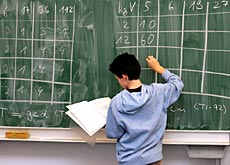
Cheer for pupils’ progress might be premature

Education experts say an international comparison showing that Swiss pupils’ science and maths skills have recently improved should be treated with caution.
The second “Pisa” study of 41 countries was released on Tuesday and came as something of a relief to Swiss educationalists, after the country’s poor showing in the first, conducted in 2000.
The results, from the Programme for International Student Assessment (Pisa), showed that 15-year-olds in Switzerland had climbed in the international rankings in science and maths, since the last study.
In reading there was a slight improvement, but the score was slightly above the international average.
Switzerland’s showing in the first study, published in 2001, provoked a national debate about why pupils had such poor literacy skills. Some blamed the use of Swiss-German dialect in primary schools, others the high proportion of foreigners.
Experts say the better score this time around probably has little to do with lessons learnt since the last Pisa study.
Anton Strittmatter from the Swiss Teachers Association observed that the improvement was more likely down to the development and reforms of the past ten years since dramatic changes could not be achieved in such a short period of time.
The new study, conducted in 2003, found that Swiss pupils had improved their ranking in maths (9) and science (12) since 2000, but that reading was as poor (13) as three years ago.
With 527 points in maths and 514 points in science, they have scored clearly above the average of 500 points, whereas in reading they achieved only 499 points.
“The improvement in science is considerable and in maths it is slightly better, [whereas] the situation with regard to reading is equally bad,” Jürgen Oelkers, pedagogic professor at Zurich University, told swissinfo.
Oelkers believes the good results in maths can be attributed to new teaching methods used in the last three years of secondary school.
Realistic
“Classes are more pupil oriented and tasks are presumably more life-oriented than they used to be. The Pisa test, combining both, requires problem-solving strategies and realistic and down-to-earth tasks and solutions,” he said.
Oelkers thinks the improvement in the Pisa scores could be down to the fact that teachers had taken the Pisa test more seriously this time, and might have prepared their pupils better.
That possibility worries some experts, who fear that schools may be more interested in having their pupils achieve better scores, rather than improving education standards overall.
“How stable the results of the Pisa study are will need to be further discussed, because ‘teaching for the test’ is not what one wants,” said Strittmatter.
“We have to accept that there is still room for improvement as the results of [the most recent] test have shown,” he added.
Gianni Ghisla, co-founder of the educational journal “Babylonia”, warns that at the moment achieving a higher ranking seemed to be more important than improving standards. “Improving the ranking does not automatically mean improving pupils’ performance.”
The study showed that reading was a weakness among 15-year-olds in Switzerland.
Oelkers maintained that the reading score, which had not improved significantly, was below average and was certainly not satisfactory.
“We infer from the test result that improving the reading ability of students is more difficult [than we thought it would be] and that more needs to be done,” he said.
Boys
According to Strittmatter, the situation is not generally serious, but the fact that a high percentage of pupils does not achieve the required standard is alarming.
“We have to make an effort to integrate disadvantaged students and, especially to teach boys to read,” he said.
It is essential that schools focus on certain groups – especially boys from families with little education – and help them learn to read much earlier and more effectively, says Oelkers.
He said most primary schools were already introducing special programmes, which would certainly “boost [reading results] in the next Pisa study”.
Pisa is based on studies analysing the employment outlook for adults. These studies show that reading is a core competency in the job market.
Oelkers said Pisa provided a meaningful comparison among countries because it was based on the same criteria.
“The comparison, which has been carried out in a relatively large number of countries, represents a test with only one set of rules that apply to all countries.”
Ranking high in the Pisa test is not a question of national pride, but a question of how pupils compare with the peers in other countries, according to Oelkers.
“It is about developing labour markets and it is important for [pupils to] achieve good results.”
swissinfo, Katalin Fekete
The Pisa study compared maths, science and reading skills of 15-year-olds.
250,000 pupils from 41 countries took part.
Pisa is a project of the Organisation for Economic Development and Cooperation (OECD).

In compliance with the JTI standards
More: SWI swissinfo.ch certified by the Journalism Trust Initiative
















![The four-metre-long painting "Sonntag der Bergbauern" [Sunday of the Mountain Farmers, 1923-24/26] had to be removed by a crane from the German Chancellery in Berlin for the exhibition in Bern.](https://www.swissinfo.ch/content/wp-content/uploads/sites/13/2025/12/01_Pressebild_KirchnerxKirchner.jpg?ver=cb688ed5)














You can find an overview of ongoing debates with our journalists here . Please join us!
If you want to start a conversation about a topic raised in this article or want to report factual errors, email us at english@swissinfo.ch.